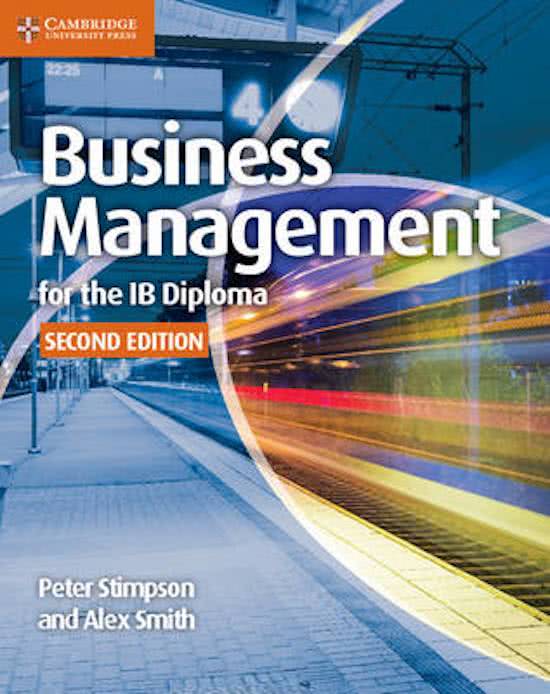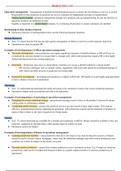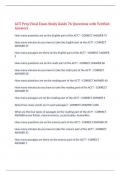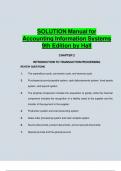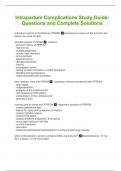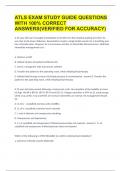Operations management = management of production/transformation process to ensure the best product or service is created
- Responsible for the production of goods & services in a business & fundamental activities of organizations
- Product based company: operations management designs new products, sets up manufacturing, & runs the factories to
guarantee products are produced on time
- Equally as important in a service based company, by overseeing all processes to ensure customers are satisfied
Relationship to other business function
★ Operations function is interdependent (relies on) the following business functions:
Human Resources
● Role: To ensure that the firm has the right quality and quantity of labour to meet its overall corporate objectives
● Operations are done by people/HR
Examples of interdependence of HR & operations management:
● The scale of production = mass production can require significant amounts of unskilled labour so HR will focus on
recruitment & selection initiatives to ensure there is enough staff, while niche production requires HR to hire highly
skilled individuals/motivate existing employees
● Relocation = Businesses may move to cheap labour countries or to access a skilled workforce/ a larger market
○ HR can face challenges such as cultural clashes, negotiation with local trade unions & recruitment/training of
staff which can affect process of goods/services being made
● Research & development = developing new products is a highly skilled task - HR needs to recruit highly paid specialists
to have a chance of success in production
Marketing
● Role: To understand and anticipate the needs and wants of its customers to lead to the correct marketing strategies
● Operations outputs need to promoted and sold at the right place
Examples of interdependence of marketing & operations management:
● Designing the correct marketing strategy = promotional messages need to focus on the product’s features & unique
selling points to sell business outputs
● Conducting market research = ensures that goods & services can meet needs of their target market. This requires
effective communication between marketing & operations, which feed into research and development of products to
improve them (relates to the type of good/service being made)
Finance
● Role: To ensure that funds are available for a smooth and continuous workflow. Money should be available to buy raw
materials, equipment & maintain them, while paying wages & salaries on time.
● Operations need to be funded
Examples of interdependence of finance & operations management:
● Updating production facilities = mass production lines have very large set up costs & long-term sources of finance
should be used to investe (shares, mortgages, loans), thus the operations manager may know which production costs
could be cut, to have an impact on the break even point
● Payment systems (workers) = ensures that workers/employees receive payments on time. E.g: if wages are based on
productivity, staff can be rewarded with bonuses if there is a greater output (incentive to increase productivity in
operations)
, Producing Goods & Services
- Operations involves the process of turning a firm’s resources/factors of production into goods/service people want to
buy
- Slight differences in the inputs used and outputs produced in businesses
- Firms make profit by adding value to the outputs made
Factors of Production (used to make goods/services)
1. Land - natural resources/raw materials
2. Labour - human labour: workers, employees, management
3. Capital - money needed to open a business & tools, machinery or equipment used in a business
4. Entrepreneurship - person who organizes the factors of production to create outputs to create the enterprise/business
Highlight
Note
Terms:
Products = output of the operations management
Goods = products that are tangible (example: computers, cars, food)
Services = products that are intangible (example: watching a movie/renting a car) - there is little physical evidence of what you
consumed
Semi goods / services = overlap between the product being both a good & service (i.e: cosmetic surgery or airline travel)
Value adding = process of transforming inputs into outputs that are desired by consumers
Transformation = process where inputs are assembled into outputs (useable)
Ecological, social and economic sustainability
★ Operations management is influenced by social, ecological & economic factors & firms should aim to be sustainable in
all areas (benefits reputation & planet)
Economic sustainability = the need to use available resources & raw materials to their best advantage, ultimately ensuring
profitability and financial performance over long term
- Budgets must be respected, wastage kept to a minimum, further savings should be made (such as cutting energy costs)
Social sustainability = the need to take human factors into account both internally (e.g. workers) and externally (e.g. local
communities) when making business decisions
, - Seek to ensure all employees are fairly treated, working conditions are acceptable, quality of life for local people is not
negatively affected by firm
Ecological sustainability = the need to take ecological factors into account when making business decisions (especially about
nature and ecosystems)
- An understanding that managers have towards their operations creating air pollution, water pollution, or noise pollution.
Triple bottom line = the need to take economic, social and ecological factors into account when making business decisions
- Stresses importance that business decisions should not only consider financial aspects, but be aware of local
communities and natural environment
TBL ties into operations where manufacturing processes may have more negative impacts than marketing or financial
transactions
Business Notes - 5.2
Job Production
● Produces unique items that are tailor-made to meet the needs of individual customers
○ Businesses using this production method have highly specialised, unique products that fulfill exact
needs/requirements of customers
○ It is generally slow/has low productivity - average costs are higher than other production methods
○ Uses highly skilled labour & works on a single product at a time
When is it used?
- When customers have specific requirements that cannot be used with other techniques/want unique products to meet
their needs
- When the client base is small/low demand
Examples:
1) Haircuts
2) Tailor-made suits
3) Starbucks coffee
Benefits Limitations
It is built exactly to customer’s requirements - higher selling Small scale of output may result in very high average costs
price can be demanded
Workers are often more motivated - building a unique product If used to build ‘mega projects’ (bridges or stadiums) demand
- fewer mistakes & higher quality product is likely to be irregular/lead to potential cash flow problems


